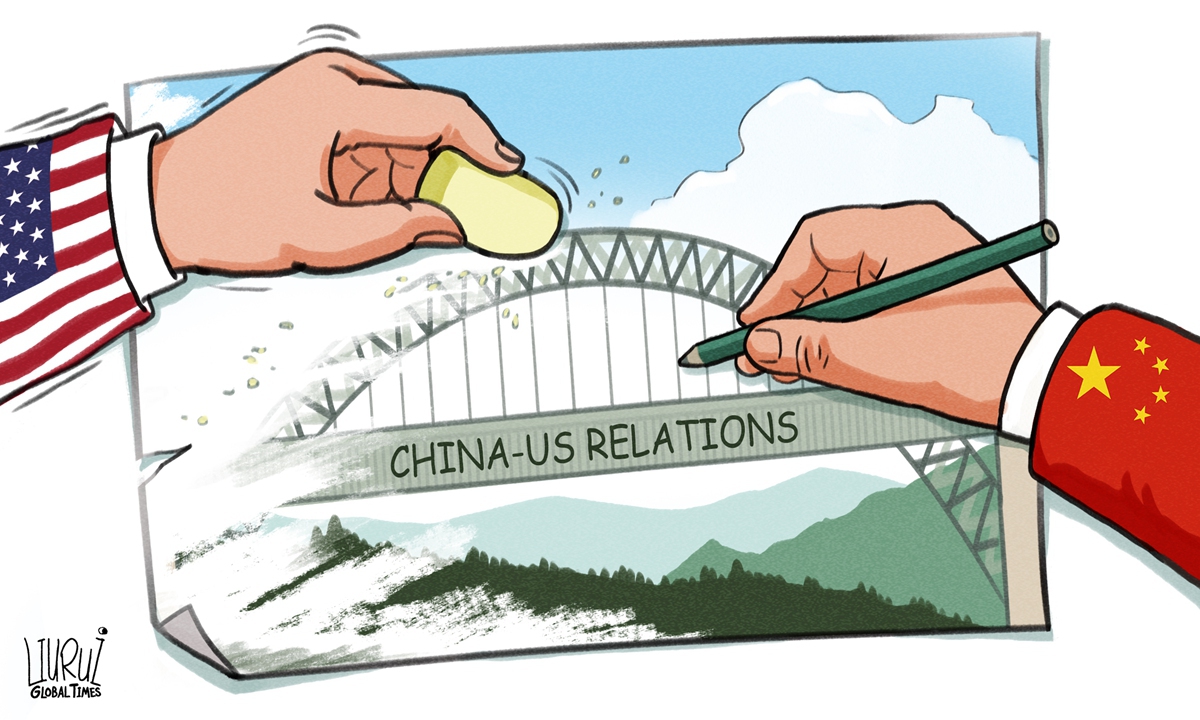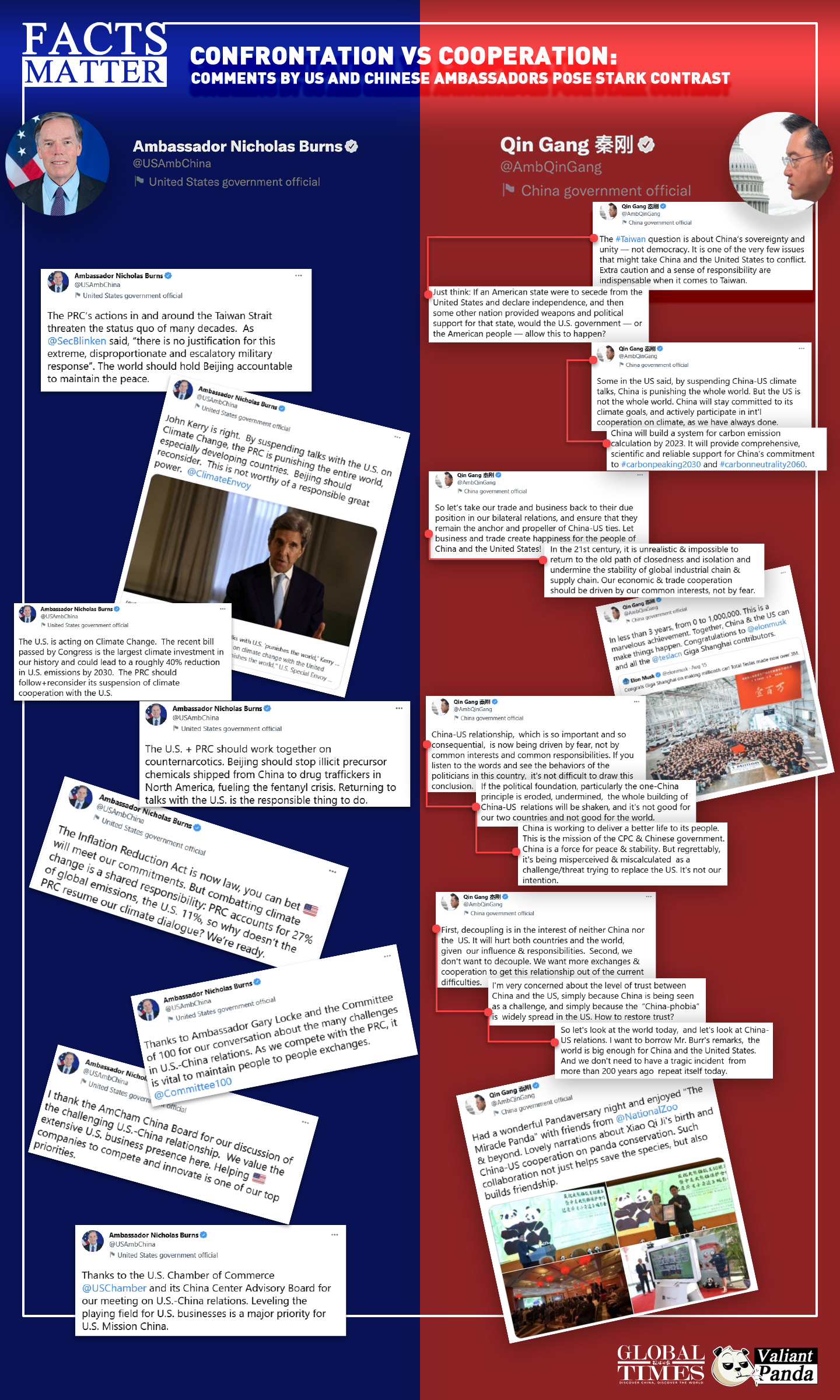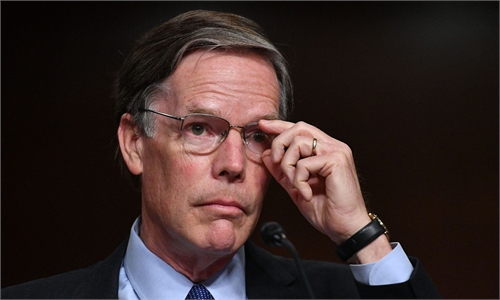What makes a good ambassador – building China-US bridges like Qin, or cutting ties like Burns?

China-US relationship. Illustration: Liu Rui/Global Times
It is not difficult to find out who is genuinely contributing to the China-US relations and who is a destructive force, when comparing the recent remarks from Chinese Ambassador to the US Qin Gang and US Ambassador to China Nicholas Burns, especially after US House Speaker Nancy Pelosi's provocative visit to the island of Taiwan. Their different remarks and attitudes toward bilateral ties are a microcosm of the foreign policies of China and the US.
Burns' tweets since August have been full of groundless accusations against China on multiple fronts, including the China-proposed Belt and Road Initiative and China's policy toward Taiwan island. In particular, his slams on China for "overreacting" to Pelosi's Taiwan visit and his suggestion that China is "manufacturing a crisis" in the Taiwan Straits in an interview with CNN last week have drawn intense criticism.
Burns is not a qualified ambassador. His remarks on Pelosi's visit to Taiwan exposed the limits of his understanding of complicated China-US relations. Although he has been in the role for six months, he has launched various accusations against China with a distinct thug-like mentality.
Burns seems to be simply implementing the policy of the US State Department, even more intensively, Lü Xiang, a research fellow at the Chinese Academy of Social Sciences, told the Global Times. Lü said that compared with his recent predecessors, Burns tends to be more disruptive. Even Terry Branstad, a Republican and a loyal supporter of former president Donald Trump, was more friendly and restrained when stationed in Beijing.
Ambassadors should have more understanding and engagement with the host country and act as a bridge between the two countries.
Instead of acting as a bridge to heal divisions, the US ambassador to China is making himself a hammer to further shatter bilateral relations. This is an extremely harmful and regrettable positioning of the role of an ambassador to China. He himself has become part of the tension between China and the US.
In comparison, Qin's recent words and deeds fully demonstrate the role that an outstanding diplomat should play. Qin is striving to build bridges rather than deliberately deepening the divide between the two countries.
In a recent interview with a US media outlet, he said, "I need people to help, telling me their suggestions so that I can digest and I can report to Beijing. This is my role: a bridge, a listening post and a helping hand."
Although China-US relations have dropped to a freezing point, Qin has still communicated actively in business, academic and political circles, showing that China has always adhered to building bridges instead of walls, Lü noted.
The diplomatic actions of major powers have a big influence, and these countries must understand the consequences of what they do. A diplomat should be careful with every word. Major power diplomats should show more sense of responsibility, and Ambassador Qin has done a great job in this regard.
Of course, the words and deeds of diplomats are not only their personal views - they represent the positions of their countries' governments on their relations and diplomatic strategies.
Ambassador Qin's positioning of himself mirrors China's efforts to develop China-US relations based on China's bottom line. Despite the deterioration of bilateral relations, China will not give up attempts to repair relations at the strategic level. Even though the US' political warfare and various provocations are greatly detrimental to China-US relations, China has not intentionally provoked the US in any way, which reflects China's responsible diplomacy.
But Burns' rhetorics show that the US government is now very rigid, as if there is nothing but competition between China and the US. Although the US occasionally talks about how China and the US should cooperate on deal with climate change, even that is just lip service.
Against this background, US diplomacy is increasingly destructive. The US will ramp up its attempts to coerce smaller countries and force them to take sides between China and the US. As for China, the US can see only threats, believing that China will displace the US. The US will try its best to provoke China in various fields. This is a dangerous trend, and the international community should remain vigilant.
The author is a reporter with the Global Times. opinion@globaltimes.com.cn

Confrontation vs cooperation: Comments by US and Chinese ambassadors pose stark contrast


